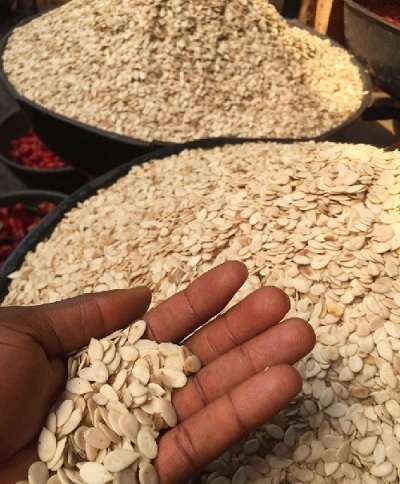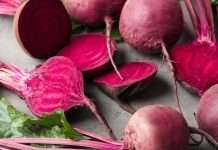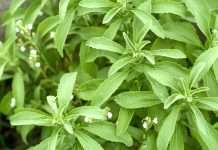 Cucumeropsis mannii Naudin (Fam. Cucurbitaceae) is called agushi in Hausa, egwusi in Igbo and Egusi in Yoruba. In English, it is known as Mann’s cucumeropsis, African melon and white-seed melon, while egusi is the common or generic name.
Cucumeropsis mannii Naudin (Fam. Cucurbitaceae) is called agushi in Hausa, egwusi in Igbo and Egusi in Yoruba. In English, it is known as Mann’s cucumeropsis, African melon and white-seed melon, while egusi is the common or generic name.
Constituents
Cucumeropsis mannii contains fibre, carbohydrates, in form of starch and soluble sugars; protein; essential amino acids like histidine, isoleucine, leucine, lysine, methionine, phenylalanine, threonine, tryptophan, valine; as well as fatty acids in form of linoleic, oleic, palmitic and stearic acids. Also present are minerals like calcium, iron, zinc, potassium, phosphorus, magnesium, copper, and selenium, and vitamins E, A, C, B1, B2 and niacin.
Preparations
Egusi seeds can be pressed for oil, ground, soaked, fried, roasted, baked, fermented, and sauteed. They can be used to thicken soups, season food, or prepared snacks and smoothies.
Pharmacological actions and medicinal uses
The rich antioxidant content of egusi is beneficial in preventing metabolic diseases like cancer, diabetes, and heart disease. The potassium and omega 6 fatty acids found in high amounts in egusi may help to prevent heart attacks, lower high blood pressure and lower levels of bad (LDL) cholesterol.
Eating a diet rich in egusi seeds will help to prevent osteoporosis, promote bone growth, improve muscle function, and prevent demineralisation of bone cells because of its rich content of calcium, magnesium, and phosphorus. A diet rich in egusi and other plant proteins will help prevent anaemia and boost healthy growth.
In some cultures, egusi juice serves as supplementary food for babies, when breast milk is unavailable. In Ghana, the fruit juice, mixed with other ingredients is applied to the navel of newborn babies to accelerate the healing process until the cord relics drop off. Macerated leaves are used in Gabon for purging constipated suckling babies.
The egusi seed oil contains antioxidants like vitamin E that help to moisturize the skin, reduce dullness, and fight signs of early ageing. Hair growth is boosted by the protein and magnesium content of egusi.
It is proposed that the erectogenic potentials and the erectile-promoting benefit of egusi seeds could be a function of the phytochemical constituents. Several studies have shown that egusi can help in reducing blood sugar as a result of its insulinogenic properties.
Adverse effects
Excessive intake of the white melon seed can cause diarrhoea, vomiting, other GI problems, dangerous lowering of blood sugar (if taken with insulin) liver damage and predisposition to anaemia in those with G6PD deficiency.
Economic uses and potentials
The global melon seeds market was valued at US$ 695.3 million in 2018. It was sold for $20 per kg in the International market, though it could be obtained for less than $3 per kg in local markets, here in Nigeria. One paint bucket of egusi (machine peel) costs about N3,600-N4,500.00, while a hand peel costs about N5,000-N6,000; a milk cup costs about N150.00.
There is so much that individuals, communities, companies, investors and governments at local and international levels can benefit from egusi in cultivation, distribution, sales, food, pharmaceutical and cosmetics industries.













